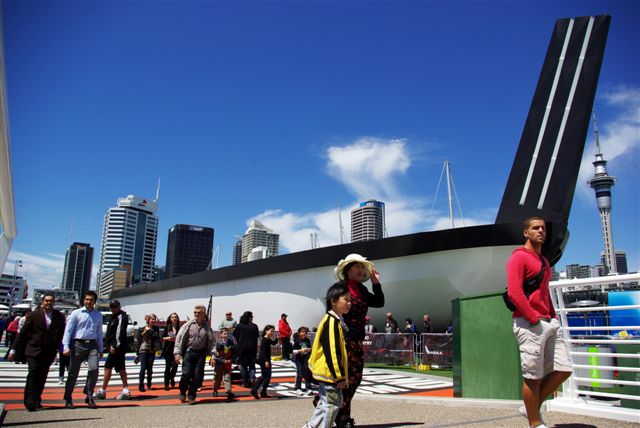A huge waka-shaped pavilion, cornerstone of the very popular Rugby World Cup event, may be seen next year in London during the 2012 Olympic Games.
New Zealand won the recently concluded Rugby World Cup.
Discussions are underway between the New Zealand Olympic Committee and Ngati Whatua o Orakei to take the 76-metre long Waka Maori to the United Kingdom.
The 76-metre long waka has been on the Auckland waterfront since 13 October where it has seen around 400,000 visits to the Waka Maori events that included performances in the waka, a Maori rugby exhibition and carving, weaving, ta moko and contemporary Maori arts displays at the artisans village.

The waka cost $900,000 to build and was funded by Te Puni Kokori, the Ministry of Culture and Heritage and the Ngati Whatua o Orakei Maori Trust Board.
The waka has made an impact at the Rugby World Cup fanzone and it could provide a focal point for New Zealand activities in London, says New Zealand Olympic Committee Commercial and Marketing Director Terry Daly.
“We’re urging business and government to build on the momentum created around the Rugby World Cup and to look at ways the London Olympic Games can be used to promote New Zealand,†he says.
“A major Kiwi House in London is taking shape and the waka could add another dimension to the series of showcase events already planned.
“With millions of visitors set to attend the London Olympic Games, New Zealand will be ideally placed to show the world what it has to offer.â€
The New Zealand Olympic Committee will announce its plans for Kiwi House in London early next year.
Ngati Whatua o Orakei Maori Trust Board chief executive Tiwana Tibble says there has been a lot of enquiry, both before the rugby tournament and during, about using the waka.
“From a Ngati Whatua perspective we are interested in opportunities where the waka can be used to show New Zealand at its best and create greater awareness of Maori culture as a positive part of life in this country.
“The waka itself is a blank canvas and it is up to people to make it come alive in whichever way they want to; he tangata, he tangata, he tangata.â€

Leave a Reply